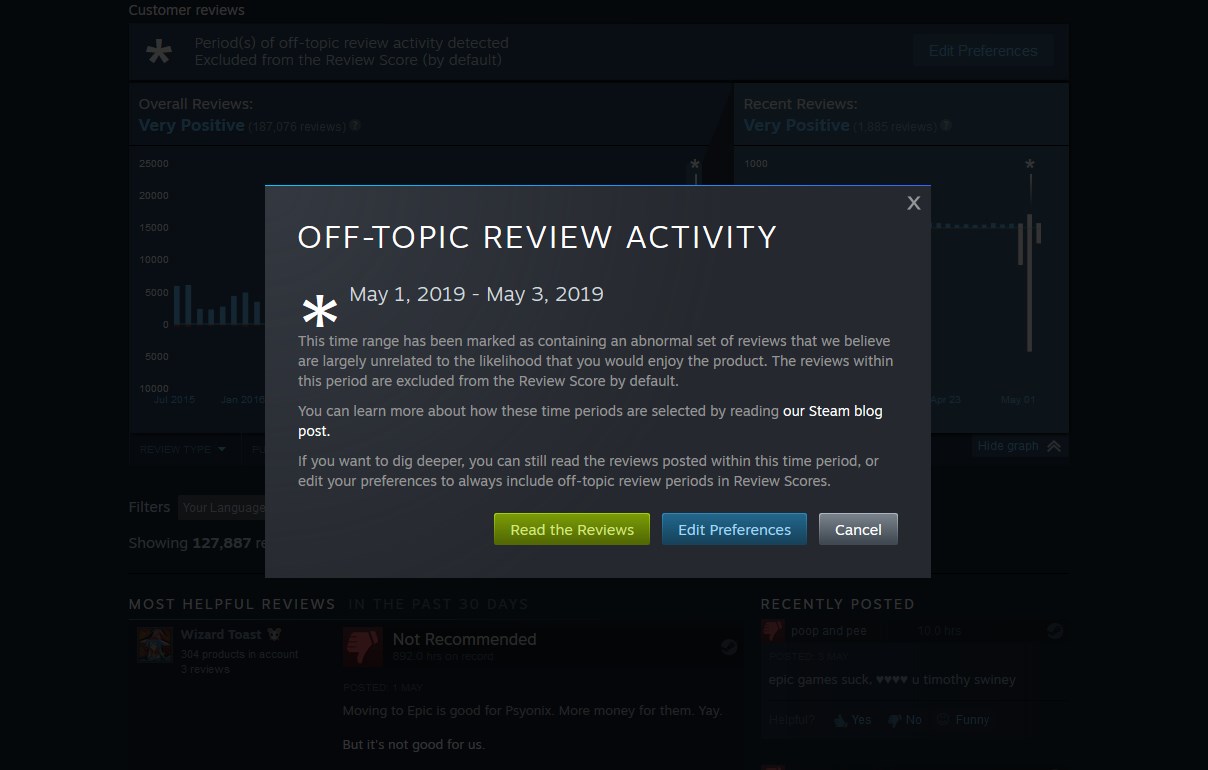Rocket League is getting review bombed because Epic bought Psyonix
More than 2,700 negative reviews have poured onto Steam, but the new anti-bombing system is working.

Epic's acquisition of Rocket League studio Psyonix earlier this week resulted in a predictable reaction: A review bombing campaign that hit the game with more than 2,700 negative reviews on Steam since May 1. Yet in spite of that effort, the user review rating, including recent reviews, remains "very positive."
That's because of the system Valve implemented in March that excludes "off-topic review activity" from review score calculations—effectively an anti-review-bomb shield. An asterisk on the Rocket League review chart leads to a message stating that "this time range has been marked as containing an abnormal set of reviews that we believe are largely unrelated to the likelihood that you would enjoy the product."

The reviews themselves remain visible in that section of the Steam listing, so you can still see entries like, for instance, the one from the player with nearly 1,900 hours of playtime who spends multiple paragraphs describing how great the game is before giving it a negative review because, "You sold your honor."
The backlash comes despite the fact that neither Psyonix nor Epic have said that Rocket League will be removed from Steam, and in fact have pledged to continue supporting the Steam edition for existing owners, even after the game goes on sale on the Epic Store. For now, nothing has changed except the studio ownership, and even that may not be a dramatic shift given the longstanding relationship between Epic and Psyonix: Rocket League is obviously the studio's best-known game, but the Psyonix website says it has also worked on Epic games including Gears of War, Bulletstorm, Unreal Tournament 3, and UT2004.
Review bombs are nothing new, but it's interesting to see Valve's anti-bombing mechanism in action, and I think it might actually prove to be a reasonable compromise solution to user review abuse: Committed players get their say, but casual "need something new" browsers won't be forced to dig down to figure out why the recent reviews of a phenomenally popular game have suddenly tanked. As the great philosopher once said, a good compromise leaves everybody mad.
Keep up to date with the most important stories and the best deals, as picked by the PC Gamer team.

Andy has been gaming on PCs from the very beginning, starting as a youngster with text adventures and primitive action games on a cassette-based TRS80. From there he graduated to the glory days of Sierra Online adventures and Microprose sims, ran a local BBS, learned how to build PCs, and developed a longstanding love of RPGs, immersive sims, and shooters. He began writing videogame news in 2007 for The Escapist and somehow managed to avoid getting fired until 2014, when he joined the storied ranks of PC Gamer. He covers all aspects of the industry, from new game announcements and patch notes to legal disputes, Twitch beefs, esports, and Henry Cavill. Lots of Henry Cavill.

